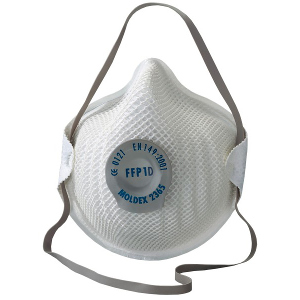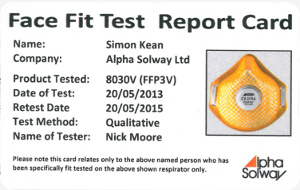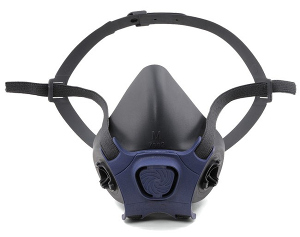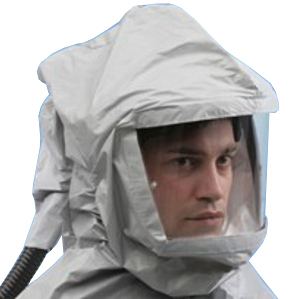
 Disposable Masks
Disposable Masks
The most common type of respiratory protection on the market are disposable masks. "Nuisance masks" are available, but these are not tested to any standard and should only be used in extremely levels of dust.
The majority of disposable masks are tested under the EN149: 2001 + A1:2009 standard. The three protection factors are:
FFP1 - When worn correctly reduces exposure to airborne particles by a factor of 4. Suitable for use in environments with low levels of dust, plus oil and water based mists such as found in hand sanding, drilling, and cutting.
FFP2 - When worn correctly reduces exposure to airborne particles by a factor of 10. Suitable for use in environments with moderate levels of fine dust, plus oil and water based mists such as found in plastering, cement, sanding, and wood dust.
FFP3 - When worn correctly reduces exposure to airborne particles by a factor of 20. Suitable for use in environments with higher levels of fine dust, plus oil and water based mists such as found in handling hazardous powders in the pharmaceutical industry or working with biological agents and fibres.
Choosing Disposable Masks
The two main styles are moulded (a preformed shape) or flat fold, which as the name suggests can be folded for easier storage in a pocket and to reduce their size. Both are equally viable and chosing between them is a matter of preference.
The other large differentiator is whether the mask is valved. Masks without valves will offer a greater resistance when breathing and will not vent the warm, moist air breathed out by the wearer -- potentially making them uncomfortable. However, non-valved masks will usually be less costly. Some valved masks will also include a carbon filter to absorb nuisance odours.
Face Fit Testing

Fit testing of respiratory protective equipment is mandatory under COSHH (Control of Substances Hazardous to Health) regulations. No matter how effective a mask is against a particular threat, this counts for nothing if it does not fit properly.
If you have a number of employees in need of face fit testing, we can help for an extremely reasonable fee. Trained staff are available to visit your site and properly fit and test employees with the exact mask they will be using.
Each employee will receive a Fit Test Passport card, giving details of which mask they were checked with and when a new test is due. For more information, please click here.
Half and Full Face Reusable Masks
A different range of European standards apply to this class of masks, namely:

EN136: 1998 - Full Face Masks
EN140: 1998 - Half Face and Quarter Face Masks
EN143: 2000 - Particle Filters
EN14387: 2004 - Gas and Combined Filter(s)
The obvious advantage with such masks is that it is the filters that are disposed of and replaced, rather than the entire mask. They can also offer a much wider range of protection from different threats.
Filters are generally split into those protecting from particulates or gas; combination filters are also available.
Particulate Filters
Rated on protection offered against the Workplace Exposure Limit (WEL).
P1 - 4 x WEL
P2 - 10 x WEL
P3 - 20 x WEL (half mask), 40 x WEL (full face mask)

Gas Filters
The following letters are used to denote the type of protection offered:
A - Organic gases and vapours with a boiling point of over 65C.
B - Inorganic gases and vapours (excludes Carbon Dioxide/Monoxide)
E - Sulphur Dioxide and other acidic gases and vapours
K - Ammonia and organic Ammonia derivatives gases and vapours
ABEK - A combination filter offering protection against all of the above
Powered Respirators
The final category of respiratory protection is powered respirators. Here the user wears a helmet or hood which is fed clean, filtered air. A wide variety of headpieces are available, including lightweight hoods, helmets, and welding shields. Examples of such types of products are the MagAir kits from Martindale.
Such kits will provide greater protection over non-powered respirators and can be more comfortable due to the air flow. On the downside, they are more bulky and depend on batteries, which need frequent recharging. A system such as the Cleanspace2 is one solution to excessive size, having no hoses and the battery built into the neckpiece.
For further advice, please contact us at sheffield.sales@ardenwinch.com or telephone us on 0114 243 3755. We have excellent relationships with a number of suppliers, such as Alpha Solway and Moldex, who can offer expert guidance.